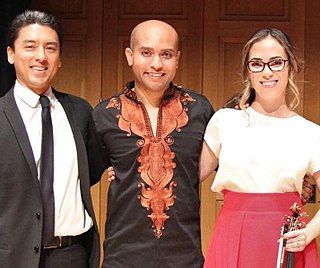Related Research Articles

Michael Babatunde Olatunji was a Nigerian drummer, educator, social activist, and recording artist.
Guy Warren of Ghana, also known as Kofi Ghanaba, was a Ghanaian musician, most notable as the inventor of Afro-jazz — "the reuniting of African-American jazz with its African roots" — and as a member of The Tempos, alongside E. T. Mensah. He also inspired musicians such as Fela Kuti. Warren's virtuosity on the African drums earned him the appellation "The Divine Drummer". At different stages of his life, he additionally worked as a journalist, DJ and broadcaster.

Obo Addy was a Ghanaian drummer and dancer who was one of the first native African musicians to bring the fusion of traditional folk music and Western pop music known as worldbeat to Europe and then to the Pacific Northwest of the United States in the late 1970s. He taught music at Lewis & Clark College in Portland, Oregon.

The University of Ghana is a public university located in Accra, Ghana. It is the oldest public university in Ghana.
Kpanlogo is a recreational dance and music form originating from the 1960s among urban youth in Accra, Ghana.
The Ga-Dangbe, Ga-Dangme, Ga-Adangme or Ga-Adangbe are an ethnic group in Ghana, Togo and Benin. The Ga or Gan and Dangbe or Dangme people are grouped as part of the Ga–Dangme ethnolinguistic group. The Ga-Dangmes are one ethnic group that lives primarily in the Greater Accra region of Ghana.
Ewe drumming refers to the drumming ensembles of the Ewe people of Ghana, Togo, and Benin. The Ewe are known for their experience in drumming throughout West Africa. The sophisticated cross rhythms and polyrhythms in Ewe drumming are similar to those in Afro-Caribbean music and late jazz. The original purpose of Ewe drumming were sung or performed by warriors. Now the songs and performed to celebrate or for recreational use. For example, Agbadza was originally used as a warrior dance but is now used to celebrate events.
Emmanuel Tettey Mensah, was a Ghanaian musician who was regarded as the "King of Highlife" music. He led The Tempos, a band that toured widely in West Africa.
Kofi Anyidoho is a Ghanaian poet and academic who comes from a family tradition of Ewe poets and oral artists. He is currently Professor of Literature at the University of Ghana.
Joseph Hanson Kwabena Nketia was a Ghanaian ethnomusicologist and composer. Considered Africa's premier musicologist, during his lifetime, he was called a "living legend" and "easily the most published and best known authority on African music and aesthetics in the world", with more than 200 publications and 80 musical compositions to his credit.

Leon Mobley is a percussionist and drummer. He is founder and artistic and musical director of Da Lion and Djimbe West African Drummers and Dancers, an actor, and a member of Grammy-winning band Innocent Criminals.

Thomas Leeb is an Austrian fingerstyle guitarist.

CalBank is a commercial bank in Ghana, that is licensed by the Bank of Ghana, the central bank and national banking regulator.

Beattie Casely-Hayford was a Ghanaian engineer. He was the first director of the Ghana Arts Council, a co-founder of the Ghana National Dance Ensemble, and a director of the Ghana Broadcasting Corporation (GBC).
Yacub Addy was a Ghanaian traditional drummer, composer, choreographer and educator who collaborated with many musicians in various genres, including Wynton Marsalis. He has been referred to as "the leading ambassador of Ghanaian music and culture".

Derrick Skye is a composer, conductor, musician, and educator based in the Los Angeles area who often integrates musical practices from cultures around the world in his works. The Los Angeles Times has described Skye's music as "something to savor" and "enormous fun to listen to." The Times (London) described Skye’s music as “deliciously head-spinning.”
Anis Haffar is a Ghanaian educationist, teacher, columnist and author. He is the founder of the GATE institute in Ghana, and is a council member of the Ghana Education Service. Also a notable journalist, he writes a weekly column for the Daily Graphic newspaper entitled "Education Matters with Anis Haffar", and the column "Leaders – Human Capital", in Business World (Ghana). Haffar was listed as one of the 100 most influential Africans of 2016 in Education by New African magazine.
Albert Mawere Opoku (1915–2002), was a Ghanaian choreographer, dancer, printmaker, painter, and educator. He was the first person to teach courses in African dance at the University of Ghana, Legon, and was also the founder and first director of the Ghana National Dance Ensemble.
Kobla Ladzekpo is a Ghanaian musical performer. He is known for being the founder and director of Zadonu African Music and Dance Company, as well as a conductor for the Cal Arts African Music and Dance Ensemble.
Theophilus Nii Martei "Theo" Martey, also known professionally as Emperor T-Jiga, is a Ghanaian-American singer-songwriter, drummer, dancer, music teacher, and music producer. Martey has led over 5000 music workshops throughout New England and Beyond. As Emperor T-Jiga, he has released singles such as "Saka Saka," "Pretty Jeniki," "Kilode," "Yeloi," You're My Baby,""Sugar and "Super Star." He has received one Ghana Music Award USA for Best International Collaboration and three additional Ghana Music Award USA nominations.
References
- 1 2 3 "Alfred Ladzekpo". 24700. 2011-06-23. Retrieved 2023-11-27.
- 1 2 3 4 5 "Alfred Ladzekpo: Co-Director of the African Music & Dance Program at Cal Arts", YouTube, retrieved 2023-11-27
- ↑ "Alfred Ladzekpo". id.oclc.org. Retrieved 2023-11-27.
- ↑ "Drumming – African Presences I: Music in Africa" . Retrieved 2023-11-27.
- ↑ "CalArts Magazine Spring/Summer 2011 by California Institute of the Arts – Issuu". issuu.com. 2011-06-15. Retrieved 2023-11-27.